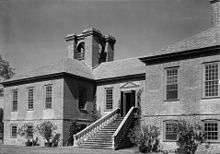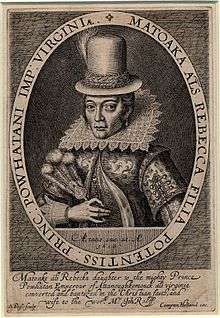First Families of Virginia

First Families of Virginia (FFV) were those families in Colonial Virginia who were socially prominent and wealthy, but not necessarily the earliest settlers.[1] They descended from English colonists who primarily settled at Jamestown, Williamsburg, and along the James River and other navigable waters in Virginia during the 17th century. These elite families generally married within their social class for many generations and, as a result, most surnames of First Families date to the colonial period.
The American Revolution cut ties with Britain but not with its social traditions. While some First Family members were loyal to Britain, others were Whigs who not only supported but led the Revolution.[2] Many of the Loyalists suffered losses after the Revolution, but many of the new American planters flourished until the Civil War prohibited their ownership of African slaves. The Civil War also disrupted agriculture which increased the financial devastation of civil conflict. Nevertheless, they kept their traditions and much of their political power. Fishwick says that by the 1950s, "the Old-time Aristocracy has not given up, or sunk into decadence as the Southern novelists suggest." They adopted modern technology and co-opted rich "Yankees" into their upper-class, rural horse-estate society.[3]
English heritage, second sons

English colonists considered members of the First Families of Virginia emigrated to the new Colony of Virginia. Their migration took place from the settlement of Jamestown through the English Civil War and English Interregnum period (1642–1660). Some royalists left England on the accession to power of Oliver Cromwell and his Parliament. Because most of Virginia's leading families recognized Charles II as King following the execution of Charles I in 1649, Charles II reputedly called Virginia his "Old Dominion" – a nickname that endures today. The affinity of many early supposedly aristocratic Virginia settlers for the Crown led to the term "distressed Cavaliers", often applied to the Virginia oligarchy. Some Cavaliers who served under King Charles I fled to Virginia. FFVs often refer to Virginia as "Cavalier Country". These men were offered rewards of land, etc., by King Charles II, but most who had settled in Virginia stayed in Virginia.
Many of such early settlers in Virginia were so-called "Second Sons". Primogeniture favored the first sons' inheriting lands and titles in England. Second or third sons went out to the colonies to make their fortune, or entered the military and the clergy. Tidewater Virginia evolved as a society descended from second or third sons of English gentry who inherited land grants or land in Virginia. They formed part of what became the southern elite in America.
In some cases, longstanding ties among families of the English gentry were carried to the new colony, where they were reinforced by marriage and other relations. For instance, there were ancestral ties between the Spencer family of Bedfordshire and the Washington family; a Spencer secured the land grant later purchased by the Washingtons, where they built their Mount Vernon home. These sorts of ties were common in the early colony, as families shuttled back and forth between England and Virginia, maintaining their connections with the mother country and with each other.
A thin network of increasingly interrelated families made up the planter elite and held power in colonial Virginia. "As early as 1660 every seat on the ruling Council of Virginia was held by members of five interrelated families," writes British historian John Keegan, "and as late as 1775 every council member was descended from one of the 1660 councillors."[4]
The ties among Virginia families were based on marriage. In a pre-Revolutionary War economy dependent on the production of tobacco as a commodity crop, the ownership of the best land was tightly controlled. It often passed between families of corresponding social rank. The Virginia economy was based on slave labor as the colony became a slave society. The landed gentry could keep tight rein on political power, which passed in somewhat orderly fashion from family to family. (In the more modern mercantile economy of the north, social mobility became more prominent. The power of the elite was muted by newcomers who gained wealth in the market economy.)
Pocahontas

Many of the First Families of Virginia can trace their ancestry to Pocahontas (1595–1617), Native American. She was the youngest daughter of Nonoma Winanuske Matatiske and Chief Powhatan, founder of the Powhatan Confederacy. According to Mattaponi and Patawomeck tradition, Pocahontas was previously married to a Patawomeck weroance, Kocoum, who was murdered by Englishmen when Samuel Argall abducted her on April 13, 1613.[5] Educated among the English of Virginia and converted to Christianity during her captivity in Henricus, Pocahontas married colonist John Rolfe at a church in Jamestown on April 5, 1614. Rolfe had become prominent and wealthy as the first to successfully develop an export cash crop for the Colony with new varieties of tobacco. Their only child, Thomas Rolfe, was born on January 30, 1615. He married and had a family: his descendants married into other elite families.
Pocahontas was much celebrated in London where she was welcomed with great ceremony at the Royal Court. She died young but became legendary as the first Indian from Virginia to become Christian, marry an Englishman, and have a known child from such a marriage. (There were no doubt mixed-race children born to lower-class colonists and Algonquian women, although they may have been neither married nor Christian.) She became an important symbol of friendly Native American-English relations of the Jamestown colony. By virtue of many fictional accounts, her marriage was romanticized and became part of the mythology of early American history.[6][7]
Organizing the FFV
In 1887, following the Reconstruction era after the American Civil War, Virginia Governor Wyndham Robertson wrote the first history of Pocahontas and her descendants, delineating the ancestry of FFV families including the Bollings, Clements, Whittles, Blands, Skipwiths, Flemings, Catletts, Gays, Jordans, Randolphs, Tazewells, and many others.[8] Excluded from this history were 'natural children', mixed-race descendants of unions with slaves, potentially such as President Thomas Jefferson's alleged four surviving children by his slave concubine, Sally Hemings. They would have shared his Randolph ancestry if in fact they were his children.
Families often used surnames as given names; for instance, incorporating a mother's maiden name as a "middle name", to document their ancestry. For example, Lt. Col. Powhatan Bolling Whittle of the 38th Virginia Infantry, Confederate States Army was an uncle of Matoaka Whittle Sims.[9]
In 1907, the Jamestown Exposition was held near Norfolk to celebrate the tricentennial of the arrival of the first English colonists and the founding of Jamestown. Preservation Virginia, formerly known as the Association for the Preservation of Virginia Antiquities, was founded in Williamsburg in 1889 to memorialize Virginia history.[10] In the 20th century, Preservation Virginia emphasized patriotism by highlighting the Founding Fathers that hailed from Virginia.[11]
Notable families
Some notable family names include:
- Allerton[1][12]
- Archer[13]
- Baskerville[13]
- Berkeley[1][13]
- Beverley[1]
- Blair[1][13]
- Bland[1][13][14]
- Bolling[13]
- Branch[13]
- Braxton[13][14]
- Browne[1][13]
- Burwell[1][13]
- Byrd[1][13][14]
- Carter[1][13][14]
- Cary[1][13]
- Chiles
- Fairfax[1][13]
- Fitzhugh[1][13][14]
- Gooch[1]
- Graves[13]
- Harrison[1][13][14]
- Hopkins[13]
- Jefferson[13]
- Jenings[1]
- Lee[1][13][14]
- Mathews[1]
- Nelson[1][13][14]
- Page[1][13]
- Randolph[1][13][14]
- Robinson[1][13][15]
- Rolfe
- Spencer[13]
- Stith[13]
- Taliaferro[13]
- Waller[13]
- Warner[1]
- Washington[13][14]
- West[1][13]
See also
References
- 1 2 3 4 5 6 7 8 9 10 11 12 13 14 15 16 17 18 19 20 21 22 23 24 Tyler, Lyon Gardiner, ed. (April 1915). "The F. F. V.'s of Virginia". William and Mary College Quarterly Historical Magazine (Richmond, Virginia: Whittet & Shepperson) 23 (4): 277. Retrieved February 11, 2011.
- ↑ Kevin R. C. Gutzman, Virginia's American Revolution: From Dominion to Republic, 1776-1840 (2007)
- ↑ Fishwick, (1959)
- ↑ The American Civil War, p. 334, John Keegan, Alfred A. Knopf, New York, 2009
- ↑ Deyo, William "Night Owl" (5 September 2009). "Our Patawomeck Ancestors" (PDF). Patawomeck Tides 12 (1): 2–7. Retrieved 6 July 2014.
- ↑ Camilla Townsend, Pocahontas and the Powhatan Dilemma (2007)
- ↑ F. W. Gleach, Powhatan's world and colonial Virginia (1997)
- ↑ Wyndham Robertson, Pocahontas, alias Matoaka, and Her Descendants, Richmond VA: J. W. Randolph & English, 1887
- ↑ Lt. Col. Powhattan Bolling Whittle, Victorian Villa: Sims-Mitchell history
- ↑ David Blight, Race and Reunion: The Civil War in American Memory, Belknap Press (paperback), 2002
- ↑ James M. Lindgren, "Virginia Needs Living Heroes": Historic Preservation in the Progressive Era," Public Historian, Jan 1991, Vol. 13 Issue 1, pp 9–24
- ↑ Fischer, David Hackett (1991) [1989]. "The South of England to Virginia: Distressed Cavaliers and Indentured Servants, 1642–75". Albion's Seed: Four British Folkways in America. Oxford: Oxford University Press. pp. 219–220. ISBN 9780195069051.
Another unlikely 'FFV' was the wayward Pilgram Isaac Allerton, a London tailor's son who emigrated in the Mayflower to Plymouth Colony and resettled in Virginia, ca. 1655, where he married into Berkeley's ruling elite.
- 1 2 3 4 5 6 7 8 9 10 11 12 13 14 15 16 17 18 19 20 21 22 23 24 25 26 27 28 29 30 "Questions and Answers". Notes and Queries (Manchester, New Hampshire: S. C. & L. M Gould) VI (2): 244–245. February 1989.
- 1 2 3 4 5 6 7 8 9 10 Purvis, Thomas L. (1997) [1995]. "First families of Virginia". A Dictionary of American History. Malden, Massachusetts: Blackwell Publishers. p. 136. ISBN 9781577180999.
Among the most prominent of these lineages are those of the Bland, Braxton, Byrd, Carter, Corbin, Fitzhugh, Harrison, Lee, Ludwell, Nelson, Randolph, Washington, and Wormley families.
- ↑ Scadding, Henry (1987) [1873]. "Biographies". In Armstrong, Frederick H. Toronto of Old. Toronto, Canada: J. Kirk Howard/Dundern Press Limited. p. 376. ISBN 9781550020274.
The Robinsons were one of the first families of Virginia where they settled about 1670, before becoming one of the first families of Upper Canada.
Further reading
- Fischer, David Hackett, Albion's Seed, Oxford University Press, 1989
- Fishwick, Marshall. "F. F. V.'s," American Quarterly (1959) 11#2 pp. 147–156 in JSTOR
- Gutzman, Kevin R. C. Virginia's American Revolution: From Dominion to Republic, 1776-1840 (2007)
- Willison, George F. Behold Virginia: the fifth crown. Being the trials, adventures & disasters of the first families of Virginia, the rise of the grandees & the eventual triumph of the common & uncommon sort in the Revolution (1951), popular history by a scholar
Notes on sources
- Note: Source 1: Captain William Tucker / Author: Barbara Jennifer Benefield / Publication: RootsWeb.com, May 12, 2004
- Note: Source 2 / Author: Doug Tucker / Publication: GenForum, Jan 16, 2006
- Note: Source 3 / Author: Marie Moore / Publication: RootsWeb.com, Nov 29, 2004 / "Note: died at sea"
- Note: Source 4 / Author: Phillip Judson Clark / Title: Royal Families and Others & also their Famous Descendants / Publication: rootsweb.com, Jan 1, 2008
External links
- "Becoming Virginians, The Story of America: A Virginian Experience", Virginia Historical Society, vahistoricalsociety.org